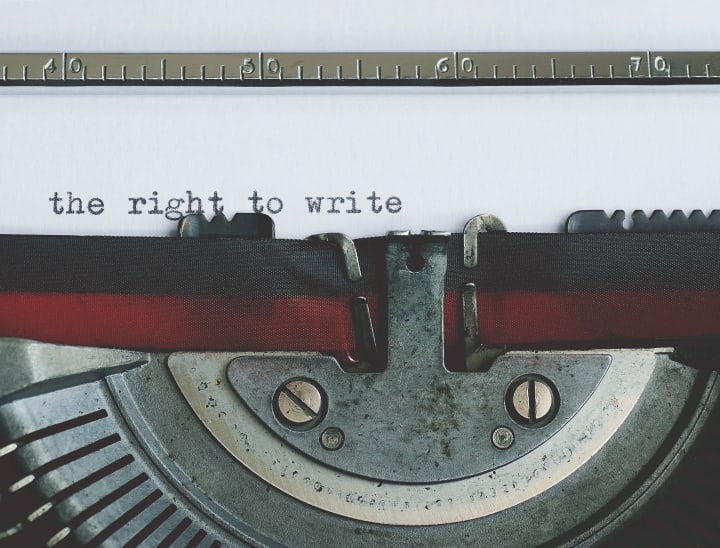Writers, What You Can Include In Your Writing
Legally

FOR THE LOVE OF WRITING SERIES
As a Writer you may come across at some time in your career, the dilemma of what you can include or how to format correctly your piece with or without references or wonder if you need to. Here it is explained for you.
Online Media is not university or college term papers. In those you are explaining your theory, your point, your opinion and supporting it by references to previously published academic papers that fit your topic by simply noting them throughout or at the end of your paper depending on which style you chose. Because your term paper is your original work and confined to the realm of academia it is not published publicly unless you are a Phd professor using it in your classroom and it has been approved to do so.
For online media writing, if it the content has been published before online then you are free to reference it. It has already been published for use online as newsworthy or some other type of article. Everything you can find on Google is published for someone to search and/or reference.
If it is a copyrighted piece of writing you must ask first if it can be included if the work states so because a novel for example might be a printed book and/or online published. Either way there should be a Copyrighted paragraph of information in the front cover which states whether it can be used freely or if you require permission to use any part of it. If it is a book most times you can quote a part of the novel and state where the quote comes from but other times you have to ask permission. That is why often times you will see in used bookstores the cover of the book torn off because, really they are not allowed to re-sell it because the author nor the publisher is getting paid. No one's ego is that great that they are going to work for free and accept a pat on the back as an accolade. Writers like to eat too.
If a person sees a book online and distributes it themselves through an online bookstore not approved by the publisher - that is illegal. If a publisher goes out of business and someone has access to an online version of a book and republishes it, not being the author - that is illegal. I found one bookstore overseas selling copies of my book online after the publisher went out of business. They flat out refused to tell me where they got copies of it from and to the publisher's knowledge that store had never ordered from them but then they went out of business and I was left with my hands in the air. I also never had an online version of my book, all my previous books were print copies only yet I found online book stores I had never heard of trying to sell them. If this happens the author is getting 0 payment, not paid at all and the unscrupulous store is illegally making money. If the author owns the copyright and therefore publishing rights it is their work and property and should be their earnings.
If it is original content on Facebook then you cannot use it, especially if it expressly says on the post, this is a sample of my writing, or my original work. You can tell the difference between a post that is put out by a business or an original one. Facebook is not a publisher, that is not their role as a social media giant. Social Media is for networking, not even selling necessarily. Posts are not formal writing so the same rules apply as above noted. If you love a particular song and are posting it to share it, along with the lyrics, as long as it says somewhere on the post whose work it is then it is acceptable to do so. If you put someone's lyrics on there as if they are your own, then you are in violation of copyright.
COPYRIGHT
Copyrights Defined "According to copyright law: The exclusive legal right given to an originator or an assignee to print, publish, perform, film, or record literary, artistic, or musical material, and to authorize others to do the same.
As soon as an original piece of work is written the author of that work owns it, it is their property inherent with copyright. Their original copy is their copyright. If they wish to copyright it formally through the government there are various ways to do so and a simple Google search will point you in the right direction. A simple and legal way to do it is to take a copy of your work, put it in an envelope and mail it to yourself. Keep it unopened along with your original work. Whether the writer/author puts it online or save it on a writing pad, it is their work and belongs to only them until they choose a publisher.

PUBLISHING RIGHTS
Publishing Rights Defined: "If copyright law didn’t exist, we wouldn’t have publishing rights to sell, and a lot of work went into securing copyright as a right for authors. As a result, we can turn our work into audio books, maybe have a movie made, reprint rights, even reprographic rights. You know, people who photocopy your work are supposed to pay you a fee. So there are just loads and loads of different rights. Read the supporting article by clicking on the bold. And essentially, the function of rights in publishing is to extend your readership. You know, why would you bother with publishing rights? To extend your readership, and to add to your bottom line."
When you publish a novel there are different strategies for publishers. Many Indie publishers or self publishers allow the author to retain the copyright and once published they hold Publishing Rights so they have the right to publish the work. This is relevant also to publish with a second publisher. You would need permission or would need to go through a legal process to add or change publishers. Some Indie or self publishers do not hold publishing rights either. Read the contract, they will be slightly different across publishers. A traditional publisher might hold both types of rights to the work for the duration of the contract. When your contract is completed with any publisher the publishing rights should revert back to you. For example, I had a traditional publisher previously that went out of business, and I received in writing my publishing rights, copyrights back.
READ your contract carefully and even have a lawyer read it over if there is anything you don't understand, before signing. For people who might have different clauses in their contract that vary, and for some reason signed away their rights to their work indefinitely that could be looked into legally. If the publisher violated their own contract as in, not paying out book royalties for example, then that could be reason for the contract to be dissolved. I have heard of authors not having the time or funds to secure a lawyer or could not find one to sue their past publisher, so the author changed their work and title and re-published and that is perfectly legal.

As a FREELANCE Writer you own the copyright, you are not an employee. Same goes for contract writer it is freelance. Read more here: "But, be aware that a freelancer doesn't have to transfer the copyright to you. If they don't, they retain copyright ownership. It's also possible to sign a license agreement, which gives you license to use their work for a limited time and purpose."
Rights of Expression Pertinent to Writers and Everyone
"Everyone has the right to freedom of opinion and expression; this right includes freedom to hold opinions without interference and to seek, receive and impart information and ideas through any media and regardless of frontiers." The link in bold is to a Google Search.
Penguin Random House summarises it nicely: here.
In Canada: "Freedom of expression in Canada is protected as a "fundamental freedom" by Section 2 of the Canadian Charter of Rights and Freedoms. The Charter also permits the government to enforce "reasonable" limits. Hate speech, obscenity, and defamation are common categories of restricted speech in Canada. Charter of Rights
In the US: "The First Amendment guarantees freedoms concerning religion, expression, assembly, and the right to petition. ... It guarantees freedom of expression by prohibiting Congress from restricting the press or the rights of individuals to speak freely. First Amendment
In conclusion writers, you can re-source any articles online or you can reference or quote. All writing in some form or other is a matter of opinion whether supported by your profession or not. I hope you find this article helpful and please also do your own research. Google is a valuable source and also go to specific writer's and publishers websites for more information.

By Lisa Lachapelle, Writer, Author. More of her work here and here.
Have a story to tell or are you a burgeoning writer? Click this link here to
sign up and start writing on Vocal. A Free membership allows you to write and be published online but for $10/month you can enter the Writer's Challenges for a chance to win $5,000 plus other perks: https://vocal.media/challenges/the-vocal-fiction-awards?via=60bbda
About the Creator
Canuck Scriber L.Lachapelle Author
Published Poet and Author. Making rainy days feel like Sundays with words.
Reader insights
Outstanding
Excellent work. Looking forward to reading more!
Top insights
Heartfelt and relatable
The story invoked strong personal emotions
On-point and relevant
Writing reflected the title & theme






Comments (2)
Great blog post! It provides valuable insights for writers on what they can include in their writing to make it more engaging and impactful. The tips and suggestions offered are practical and easy to implement. I particularly appreciate the emphasis on storytelling, as it adds a personal and relatable touch to any piece of writing. The reminder to include emotions and sensory details is also noteworthy, as it helps create a vivid and immersive experience for readers. https://wikipagecreator.org/
Your blog is amazing. I have never read that kind of blog; you covered all of the countries where freedom of expression exists. I have a book publishing agency where most of the books published are related to history, geography, and philosophy. https://www.elitebookwriting.com/publishing